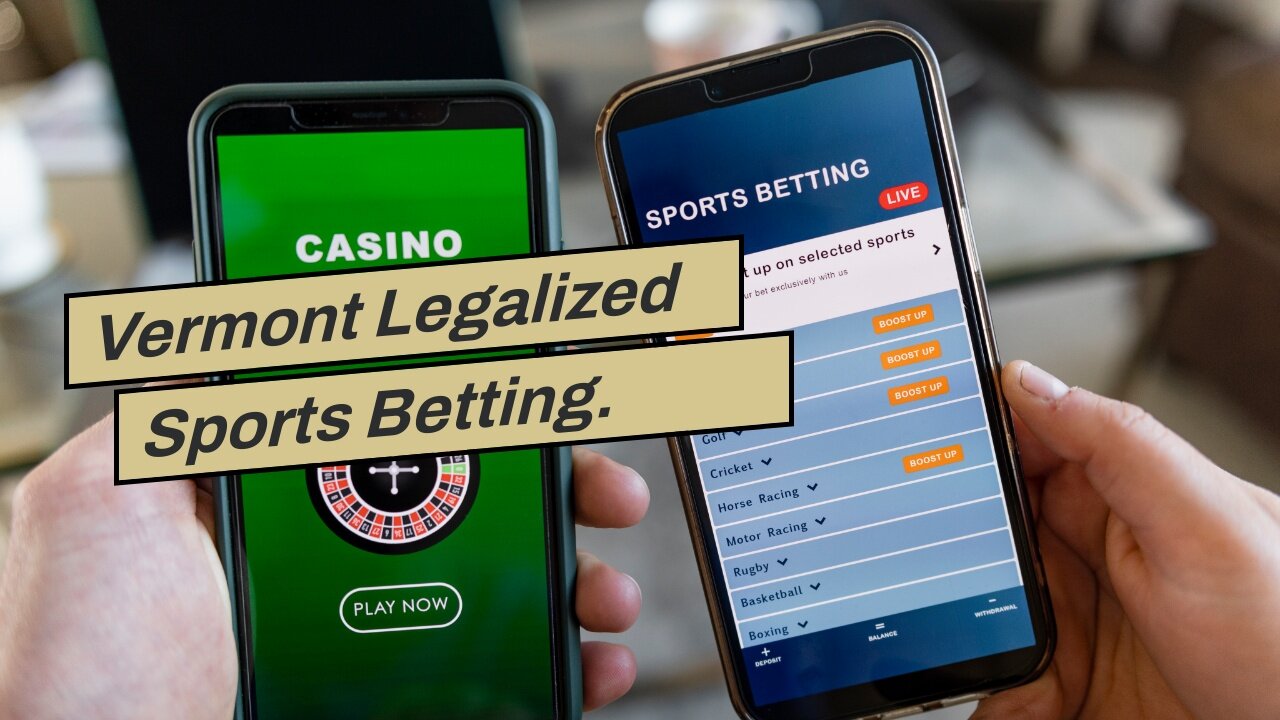Premium Only Content

Vermont Legalized Sports Betting. What Happens Now?
Vermont Legalized Sports Betting. What Happens Now? Pleas Subscribe For Daily Sports Betting News
Bet at MGM - IF YOUR BET LOSES, YOU’LL GET UP TO $1,000 BACK IN BONUS BETS - https://bit.ly/BetMGM1
Want To Place a Bet .. Download the Best Online Sportsbook! (IOS) http://bit.ly/453YUZG
Grab Barstool Sports Apparel @ The Official Barstool Store: https://bit.ly/barstool23
Bet On All The Big Games @ Xbet: https://bit.ly/xbetnow
First Deposit Bonus Up To $500 + $10 Casino Chip
Please Subscribe!
The legislation needed to get online sports betting sites off the ground in Vermont is officially law, but now begins the work to implement the blueprint lawmakers have laid down.
H.127, signed by Gov. Phil Scott on Wednesday, authorizes the state's Department of Liquor and Lottery (DLL) to conduct legal sports betting by signing contracts with mobile operators, such as DraftKings or FanDuel.
“I first proposed Vermont legalize sports betting several years ago and I’m happy the Legislature has come to an agreement, as well,” Scott said in a press release. “We know many Vermonters already participate in the marketplace...
The legislation needed to get online sports betting sites off the ground in Vermont is officially law, but now begins the work to implement the blueprint lawmakers have laid down.
H.127, signed by Gov. Phil Scott on Wednesday, authorizes the state's Department of Liquor and Lottery (DLL) to conduct legal sports betting by signing contracts with mobile operators, such as DraftKings or FanDuel.
“I first proposed Vermont legalize sports betting several years ago and I’m happy the Legislature has come to an agreement, as well,” Scott said in a press release. “We know many Vermonters already participate in the marketplace and bringing it above board provides important resources and consumer protections.” Vermont Gov. Phil Scott has signed H.127, an online sports betting bill, into law. The state's Department of Liquor and Lottery will now run a competitive bidding process to determine the (ideally) two to six mobile operators that will take bets:https://t.co/VWxnTHmnjv pic.twitter.com/ZSd8GYLXw5 — Geoff Zochodne (@GeoffZochodne) June 14, 2023 DLL will act as the regulator of Vermont sports betting and develop a competitive-bidding process to decide which operators will take action in the state. The legislation envisions the selection of two to six operators that will turn over at least 20% of their revenue to Vermont, in addition to a $550,000 fee they will not need to pay again for at least three years.
In determining which bids are best, the department must look to maximize revenues for the state, reduce the illegal market, and protect Vermonters from problem gambling. The DLL's board will set criteria for choosing operators with some mandatory requirements, such as ensuring applicants provide estimates of their possible wagering revenue and the percentage of those receipts they will pay to the state if chosen.
That said, the new wagering law does not force the department to choose two or more operators if there are not that many qualified applications. If the bidding process fails to produce the desired results, the regulator can select one operator, or none at all.
Residents will have to be 21 or older to wager when the state's mobile sportsbooks launch, which is expected to happen early next year. The types of wagering available to Vermonters will be plentiful, including single-game bets, parlays, props, and in-play options.
There will be a wide variety of events to wager on as well, except for high school sports and college games played in Vermont or involving state schools unless the team is playing in a tournament like March Madness. Bettors can't use credit cards to fund their accounts or place wagers.
Rules and revenue
DLL will oversee the implementation of a statewide voluntary self-exclusion program for players to ban themselves from wagering for a certain amount of time. Residents concerned about their gambling can put themselves on the list, after which they can no longer wager with the state’s authorized operators.
Operators are banned from advertising products chiefly aimed at people under 21 years old. Bookmakers are also prohibited from offering "risk-free" bonuses if they require players to risk their money.
Additional advertising restrictions include a ban on targeting residents under the age of 21 and a prohibition against promoting sports betting on a college campus...
-
 LIVE
LIVE
LFA TV
15 hours agoTIME FOR TARIFFS! | LIVE FROM AMERICA 1.31.25 11am
3,973 watching -
 LIVE
LIVE
Caleb Hammer
51 minutes agoFinancial Audit’s Dumbest Guest Ever
118 watching -
 LIVE
LIVE
Major League Fishing
1 day agoLIVE! - Bass Pro Tour: Stage 1 - Day 2
661 watching -
 LIVE
LIVE
Wendy Bell Radio
6 hours agoUNAFRAID
12,834 watching -
 LIVE
LIVE
Rethinking the Dollar
40 minutes agoThursday Morning Check-In: Trump Plays Blame Game, Fed Pauses and Metals Respond
169 watching -
 DVR
DVR
Randi Hipper
1 hour agoBrace for Impact: XRP ETF Could Skyrocket Your Portfolio!
2.04K1 -
 44:09
44:09
BonginoReport
5 hours agoCapitol Hill Showdown: Kash Patel & Tulsi Gabbard Face Off Against DC Swamp (Ep.130) - 01/31/2025
74.7K77 -
 2:40:38
2:40:38
Matt Kohrs
11 hours agoPCE Inflation Report, Trade Wars & Payday Friday || The MK Show
19.8K1 -
 1:41:13
1:41:13
Jeff Ahern
2 hours ago $1.63 earnedFriday Freak Out with Jeff Ahern
12.7K2 -
 1:56:58
1:56:58
Game On!
11 hours ago $1.79 earnedJustin Tucker joins NFL legends in recent massage SCANDAL!
20.1K2